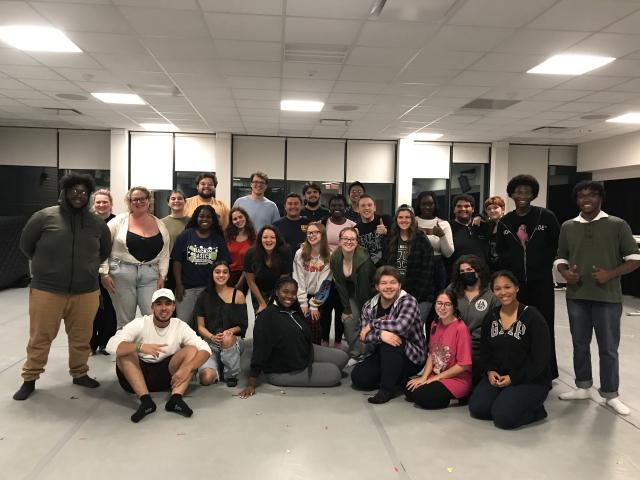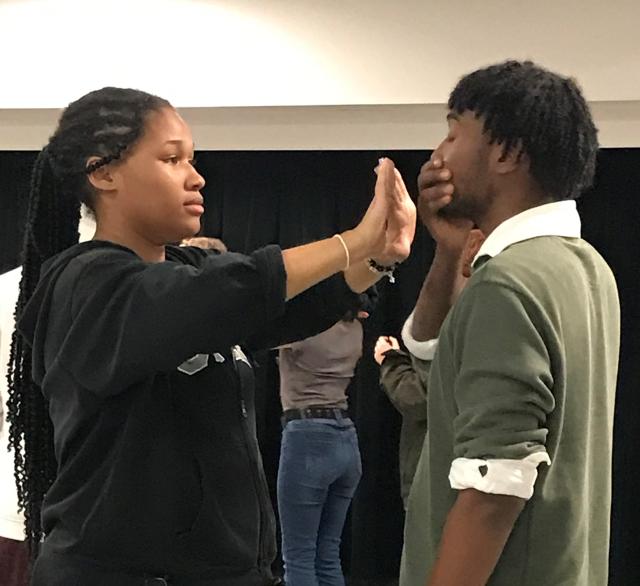Theatre Students and Faculty Participate in On-Stage Intimacy Training

Kean Theatre Conservatory students and faculty learned how to stage kisses and other theatrical intimacy during a workshop co-sponsored by the Conservatory and the Office of Diversity, Equity and Inclusion (DEI).
Techniques that actors use to rehearse a kissing scene, offer consent for onstage touching, and perform sexual violence onstage were among those taught.
“Our faculty as a group wanted to expand our knowledge of how actors can be empowered to give consent on the stage and in rehearsal,” said Kean Associate Professor Rachel Evans, chair of the Theatre Conservatory.
Intimacy choreography has long been used in film production, she said, but is now becoming common in live theatre and theatre education, in part motivated by the #MeToo movement.

“If you’re getting ready to rehearse a stage kiss, you want to make sure the actors feel they’re empowered to determine when that happens, how it happens, and have the moment carefully choreographed,” Evans said. “Everyone’s much more sensitive to their own needs and the needs of their partners on stage, so you don’t want to take anything for granted in terms of consent.”
The workshop was taught by Theatrical Intimacy Education, a consulting group specializing in researching, developing and teaching best practices for staging theatrical intimacy.
Firm co-founder Laura Rikard, a director, actor and associate professor at the University of South Carolina Upstate, conducted workshops with Kean students and faculty in September.
The training included the history and importance of intimacy choreography, and how actors can express physical boundaries to their scene partner prior to rehearsal. Students learned how to rehearse a kiss scene, for example, using a “placeholder” movement – putting their hands palm to palm.
Actors may rehearse a kissing scene dozens of times, and can substitute the placeholder for the actual kiss until the performers are ready to rehearse that.
Power dynamics and consent were covered as well.
“There’s always a director who inherently is considered the boss and has all the power,” Evans said, “but we discussed how we can change our practices so the actors feel more comfortable expressing their needs on a daily basis.”
Students said the session was valuable.
Nijah Muhammad, a sophomore theatre and communication minor, said she wants to go into film acting/directing or backstage work after graduation.
“I haven’t performed a stage kiss before,” she said. “I am definitely more comfortable with the idea of it now.”
Judah Gray, a sophomore from Garwood, is majoring in communication and minoring in theatre.
“We were taught that it’s okay to have your own personal boundaries or ‘fences,’” said Gray, whose career dream is to work in film and television, creating “new fun and exciting Black stories to spread love to my people.
“This training not only managed to be fun, it was also informational,” Gray said.
Assistant Professor Joshua Feliciano-Sanchez Moser already uses some of these strategies in the classroom.
“The workshop gave our students access to an industry professional, supplementing what they learn from Kean’s faculty. With TIE’s vocabulary, we are more cohesive as a Conservatory in our approach to intimacy work,” Feliciano-Sanchez Moser said.
Erin Lester, of Kean’s Office of Diversity, Equity and Inclusion, said her office’s role is to lead and co-lead work on campus that explores sensitive subjects. The Office was happy to co-sponsor the program.
“It's not only important but our priority to provide world-class training opportunities to equip our community with the skills to navigate what could be triggering with the highest respect to each community and individual's diverse experiences,” Lester said.